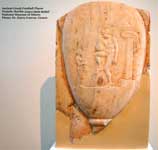
Episkyros (Greek: "ἐπίσκυρος"[1]) was an ancient Greek ball game (also called ephebike and epikoinos, "commonball"[2]). The game was played between two teams of usually 12 to 14 players each, with one ball and the rules of the game allowed using hands. Although it was a ball game, it was violent, at least at Sparta.[3] The teams would try to throw the ball over the heads of the other team. There was a white line between the teams and another white line behind each team. Teams would change the ball often until one of the team is forced behind the line at their end. In Sparta a form of episkyros was played during an annual city festival that included five teams of 14 players.[4][5][6][7][8] It was played primarily by men but women also practiced it. The Greek game of episkyros (or a similar game called "φαινίνδα" - phaininda,[9] probably meaning "deceiving game", from the verb "φενακίζω" - phenakizo, "to cheat, to lie"[10]) was later adopted by the Romans, who renamed and transformed it into harpastum,[11][12] the romanization of the Greek "ἁρπαστόν" (harpaston), neuter of "ἁρπαστός" (harpastos), "carried away",[13] from the verb "ἁρπάζω" (harpazo), "to seize, to snatch".[14] A depiction on an Attic lekythos in the National Archaeological Museum in Athens, shows a Greek athlete balancing a ball on his thigh. This image is reproduced on the European Cup soccer trophy[15]. Other ancient Greek sports with a ball besides phaininda, were: "ἀπόρραξις" (aporrhaxis) (bouncing ball game)[16] "οὐρανίαν" (ouranian), "throwing a ball high in air game"[17][18] and "σφαιρομαχία" (sphairomachia), literally "ball-battle"[19], from "σφαῖρα" (sphaira) "ball, sphere"[20] + "μάχη" (mache), "battle".[21]Mass and Elite in Democratic Athens: Rhetoric , Ideology and the Power of the People, Josiah Ober (Princeton 1989)
Julius Pollux [22] includes Phaininda and Harpastum in a list of ball games:
"Phaininda takes its name from Phaenides, who first invented it, or from 'phenakizein' (to deceive), because they show the ball to one man and then throw to another, contrary to expectation. It is likely that this is the same as the game with the small ball, which takes its name from 'harpazein' (to snatch) and perhaps one would call the game with the soft ball by the same name."
See also
* Harpastum
* History of football

A Greek Stamp with the "Ball Player Relief" from the National Museum of Archeology in Athens, 4th c. BC,
References
1. ^ ἐπίσκυρος, Henry George Liddell, Robert Scott, A Greek-English Lexicon, on Perseus Digital Library
2. ^ ἐπίκοινος, Henry George Liddell, Robert Scott, A Greek-English Lexicon, on Perseus Digital Library
3. ^ Stephen G. Miller, Ancient Greek Athletics, Yale University Press, 2006, on Google books
4. ^ Sports and games of the ancients By Steve Craig Page 101 ISBN 0313361207 (2002)
5. ^ H. A. Harris, Sport in Greece and Rome, Cornell University Press, on Google books
6. ^ Nigel M. Kennell, The Gymnasium of Virtue: Education and Culture in Ancient Sparta, The University of North Carolina Press, 1995, on Google books
7. ^ Origin of Ball Games
8. ^ Nigel B. Crowther, Sport in Ancient Times (Praeger Series on the Ancient World), Praeger Publishers, January 2007
9. ^ φαινίνδα, Henry George Liddell, Robert Scott, A Greek-English Lexicon, on Perseus Digital Library
10. ^ φενακίζω, Henry George Liddell, Robert Scott, A Greek-English Lexicon, on Perseus Digital Library
11. ^ The New Encyclopaedia Britannica, 2007 Edition: "In ancient Greece a game with elements of football, episkuros, or harpaston, was played, and it had migrated to Rome as harpastum by the 2nd century BC".
12. ^ harpastum, Charlton T. Lewis, Charles Short, A Latin Dictionary, on Perseus Digital Library
13. ^ ἁρπαστός, Henry George Liddell, Robert Scott, A Greek-English Lexicon, on Perseus Digital Library
14. ^ ἁρπάζω, Henry George Liddell, Robert Scott, A Greek-English Lexicon, on Perseus Digital Library
15. ^ Soccer: Rules, Tips, Strategy, and Safety By Brian Wingate Page 101 ISBN 0313361207 2007
16. ^ ἀπόρραξις, Henry George Liddell, Robert Scott, A Greek-English Lexicon, on Perseus Digital Library
17. ^ οὐρανιάζω, Henry George Liddell, Robert Scott, A Greek-English Lexicon, on Perseus Digital Library
18. ^ Arete: Greek sports from ancient sources Page 124 By Stephen Gaylord Miller ISBN 0520075099 (2004)
19. ^ σφαιρομαχία, Henry George Liddell, Robert Scott, A Greek-English Lexicon, on Perseus Digital Library
20. ^ σφαῖρα, Henry George Liddell, Robert Scott, A Greek-English Lexicon, on Perseus Digital Library
21. ^ μάχη, Henry George Liddell, Robert Scott, A Greek-English Lexicon, on Perseus Digital Library
22. ^ Julius Pollux, "Onomasticon", 9.105
Retrieved from "http://en.wikipedia.org/"
All text is available under the terms of the GNU Free Documentation License
|
Ancient Greece |
Medieval Greece / Byzantine Empire |
Modern Greece |
|---|---|---|
|
Science, Technology , Medicine , Warfare |
Science, Technology, Arts |
Cities, Islands, Regions, Fauna/Flora , |

